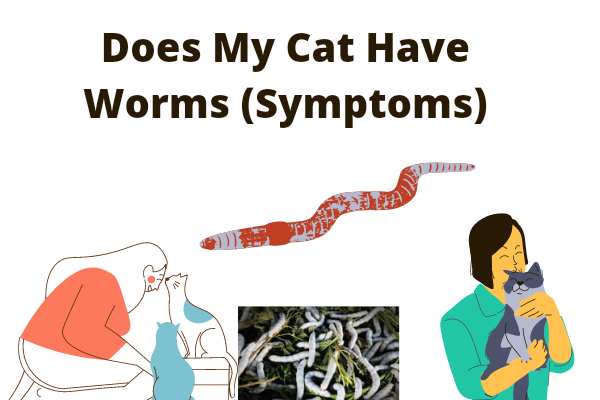Can Humans Get Worms From Cats (Detailed Answer)

Worried cat owners always ask can humans get worms from cats, in this post, we will be discussing that and much more so stay tight.
Concerns about health are one of the most common reasons why people don’t want to have a cat as a pet.
One of the most common medical concerns is worms. Will your cat give you worms? Bacteria and parasites live inside the intestines of animals, including cats.
These bacteria and parasites can pass through an animal’s feces and cause diseases in humans.
However, not all animals that carry these bacteria or parasites pass them through their feces, so it is important to know which type of animal you are dealing with before determining if it will make you sick.
The question of whether humans can get worms from cats is not an easy one.
There are many different types of intestinal worms, and they all have different life cycles.
You can become infected with intestinal worms in a number of ways, including by ingesting the worm’s eggs or larva, or by coming into contact with contaminated soil, food, water, or other people.
Some parasites that live in the intestines of humans include roundworms, whipworms, tapeworms (cestodes), and hookworms (anhelminths).
Cats are known to carry roundworms and tapeworms (cestodes), but not whipworms or hookworms.
Can Humans Get Worms From Cats
Roundworms and tapeworms are the most prevalent intestinal parasites in cats, and they are the most likely to infect humans by inadvertent ingestion of infective worm eggs conveyed through the cat’s feces, kissing a worm-infected cat, or accidentally eating a worm-infected food left in the environment by cats.
There are many things that humans can get from cats. And, yes, one of those is worms. This may sound like a bit of good news for you.
It turns out that there are some types of worms that humans can’t get from their pet cats.
However, the type of worm in question is not passed between cats and humans, but rather passed by cats to humans when they groom each other.
These worms live in the mouth of the cat and when it licks its fur it leaves eggs on its tongue.
When the cat grooms its human buddy it transfers these eggs into his or her mouth or onto his or her hand.
The human then swallows them while eating or drinks water.
A zoonotic illness is a disease that may be spread from animals to humans.
There are a number of zoonotic external and internal cat parasites, some of which are more dangerous to humans than to their cats.
This is because humans are an uncommon host for feline parasites, and when they can’t make their way to a specific feline organ, they become lost and confused in a human body and do strange things.
How do I know if my cat has a tapeworm infection?
Even though tapeworm infections in cats are uncommon, the proglottids can occasionally be observed moving around the anus or on the surface of a new bowel movement.
Tapeworm eggs are contained in proglottids, and as the proglottid dries out, the eggs are released into the environment.
The dried proglottids are tiny (approximately 2 mm), firm, and yellowish in color, and can be observed attached to the cat’s anus hair.
How did my cat get the tapeworm?
By ingesting a flea that has been infected with tapeworm larvae. During self-grooming, a dog or cat may ingest a flea.
The larval tapeworm can grow into an adult tapeworm once the flea is eaten by the dog or cat.
The mature tapeworm is formed up of proglottids, which are tiny segments roughly the size of a grain of rice.
Tapeworms may grow to be 4 to 28 inches long as adults.
These segments (proglottids) break off as the tapeworm grows inside the gut and passes into the feces.
Here are the 10 common ways indoor cats get fleas you should know and how to prevent fleas.
How is tapeworm infection treated in cats?
Treatment is straightforward and successful for cats.
Praziquantel, a prescription medication, is administered orally or via injection.
The tapeworm is dissolved within the gut as a result of the treatment.
The worm may not be seen in your ‘s feces since it is generally consumed before passing.
In general, the medicines are well tolerated.
How can humans get worms from cats?

The intestinal roundworm is a parasite that can be found in humans and cats. The intestinal roundworm is most commonly transmitted from cats to humans through contact with the feces of an infected cat, but they can also be found in the soil where cats have been playing, or through drinking water contaminated by fecal matter from an infected cat.
If worms are not treated, they can cause diarrhea, weight loss, and malnutrition.
They can also lead to more serious illnesses such as liver damage due to obstruction of bile flow.
The best way to avoid catching a worm from your cat is to ensure that it is properly cared for and kept away from any humans or other animals that might come into contact with his feces.
Intestinal parasites are transmitted to people through the fecal-oral route when they come in contact with their infected cat’s feces (or soil that contains cat feces).
Simple ways humans can get worms from cats
Here are some common ways humans can get worms from cats:
- Kissing your cat that is infected with worm.
- Licking your cat’s fur may lead to a worm infection.
- Drinking from the same water bowl as your cat may lead to a worm infection.
- Accidentally eating food with cat poop.
- Walking barefoot on soil containing infected cat poop.
- Touching soil or swallowing water or food with worm eggs in it.
- Touching objects or surfaces with worm eggs on them contaminated with infected cat poop.
Now, what!!!
The question is how do indoor cats get worms!!!!
Here is a detailed article on the 14 common ways indoor cats get worms and how to fix them.
Can you get worms from kissing your cat?

Yes, you can get worms from kissing a worm-infected cat, because worm larvae or eggs may be contained in your infected cat saliva which is easily transferred to you through the salivary glands.
However, as long as you don’t place your hands or lips near their back end, touching and even kissing your cat’s body is considered low-risk.
If you suspect your cat has worms, take extra measures by washing your hands more frequently and avoiding touching your face after stroking it.
Can you get worms from petting your cat?
People can catch worms from cats, but it’s unlikely that they’ll get worms by touching them.
Because roundworm eggs dwell in soil, touching contaminated dirt (and then putting your hands in your mouth) might spread them to you.
Another way they can be spread is by handling contaminated excrement. They also claim that youngsters are more susceptible to illness than adults.
It’s possible that this is due to youngsters coming into touch with infectious cat excrement and failing to wash their hands.
Over 60 million people in the United States are infected with the parasite, according to the Centers for Disease Control and Prevention (CDC).
Those with weakened immune systems, as well as children delivered to mothers who were infected during pregnancy, are the most vulnerable to severe infections.
I strongly recommend you stop kissing your cat for whatsoever reasons you may have.
How likely is it to get worms from your cat?
The chances of you or your children contracting worms from your or cat are quite slim.
Quality information, supported by sound research, was, nonetheless, inaccessible until recently.
We’ve known for a long time that intestinal parasites may be transmitted from pets to humans, particularly youngsters.
Quality information, supported by sound research, was, nonetheless, inaccessible until recently.
What kind of worms do cats poop out?
Roundworms are the major worms that can be found in your cat’s feces or vomit. Roundworm prevention, examination, and treatment are all things that your veterinarian can assist you with.
However, heartworms, hookworms, and tapeworms are some of the other worms that cats can poop in some cases.
Also, see How Do Cats Get Bacterial Infections: 12 Ways To Look Out For
Wrapping up can humans get worms from cats?
Absolutely, although the danger of human infection with this tapeworm is quite minimal.
To become infected with Dipylidium, a person must swallow an infected flea by mistake.
Children are involved in the majority of reported cases.
Flea management in cats is the most effective approach to avoid illnesses in both cats and people.
Infected children commonly pass proglottids (rice-like particles) in their bowel movements or discover them adhered to the skin surrounding the anal region.
The tapeworm and roundworms are the most frequent worm found in cats.
These worms live in the small intestine and can cause illness in certain people.
Dipylidium caninum is the most common tapeworm identified in cats in the United States.
Humans are unlikely to be affected by these tapeworms.
There have been a few instances recorded in youngsters, according to the CDC.
Another tapeworm that is seldom seen in the United States is the Echinococcus.
Unfortunately, they are infectious and can cause significant medical issues in people.




![Bacterial Infections in Cats Symptoms [9 Signs] bacterial infections in cats symptoms](https://petcreeks.com/wp-content/uploads/2021/03/Symptoms-of-bacteria-infection-in-cats.jpg)

